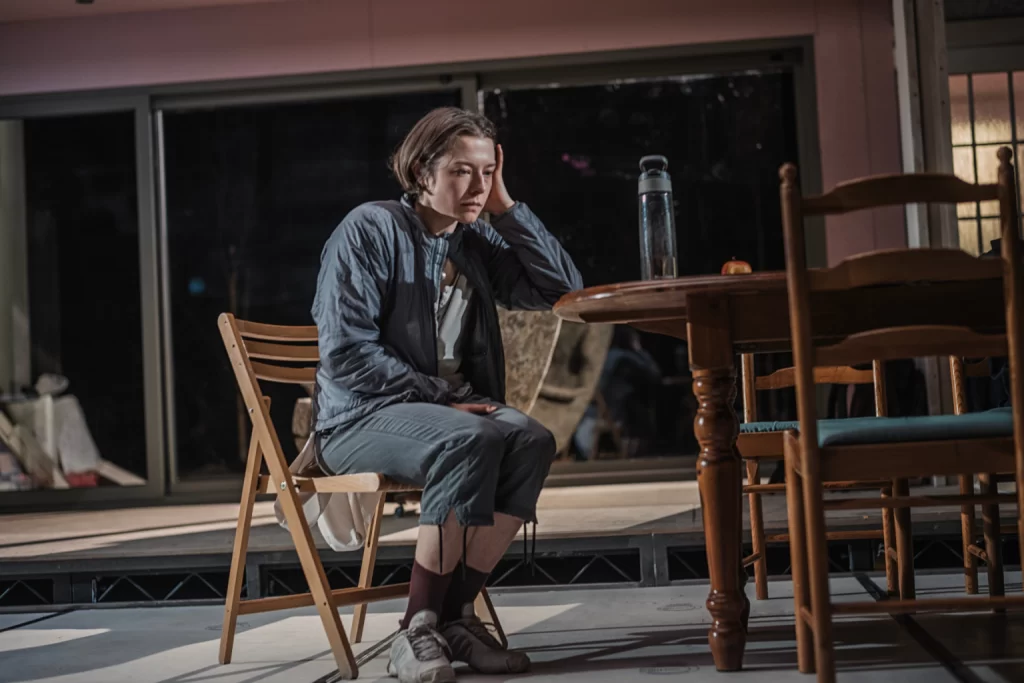THE OTHER PLACE Joins National Theatre At Home
Emma D’Arcy, celebrated for their evocative performances, is returning to your screens on 20 March in a captivating production of THE OTHER PLACE—thanks to National Theatre at Home’s latest venture.
THE OTHER PLACE, written and directed by Alexander Zeldin, is far from your ordinary family reunion story. Inspired by the Greek tragedy Antigone, this play explores the complex bonds between two sisters, Annie and Issy, brought together on the anniversary of their father’s death. But don’t expect solemn processions or archaic monologues—Zeldinhas built a contemporary world where ancient themes of duty, loyalty and grief collide with the unvarnished realities of modern life.
At the heart of this 21st-century Antigone riff is Emma D’Arcy—nominated for a WhatsOnStage Award for their performance—who plays Annie with disarming ferocity. Critics last year described the production as “astonishing,” praising how effortlessly it juggles raw emotion and moments of unexpected levity. Indeed, it’s the kind of play that refuses to let you stay in your seat as a passive onlooker; you’re pulled into every sideways glance and half-broken whisper, as though you, too, are part of this uneasy family reunion.
Zeldin, known for his previous work on The Confessions, has found a surprising partner-in-crime in Yannis Philippakis, the lead vocalist of the indie rock band Foals. Philippakis’s composition underscores the production, injecting it with a moody pulse that accentuates the tension—just when you think the sisters might reconcile, the music swells in a subtle, foreboding way that hints at the ghosts of ancient tragedies and private resentments alike. For a play that meditates so heavily on memory and the inescapable weight of familial ties, this sonic backdrop feels just right: haunting yet never overbearing.
The Stellar Ensemble
Joining Emma D’Arcy is a pitch-perfect ensemble featuring Alison Oliver (of Saltburn fame) as Issy, Lee Braithwaite (recently in Cowbois) as Leni, Jeremy Killick (from The Confessions) as Terry, Tobias Menzies (you’ll recognise him from The Crown) as Chris, and Nina Sosanya (from Screw) as Erica. This is the sort of lineup that makes even the most sceptical theatre-goer sit up and take notice. Each actor has carved out a distinct place in British theatre and screen, but here they come together like the perfectly assembled pieces of an emotionally charged puzzle.
When the show ran live at the National Theatre, the chemistry among the cast was electric—an ensemble that leaned into every charged pause and loaded silence, rendering audiences barely able to breathe. For instance, theatre insiders still chat about a particular moment when D’Arcy and Oliver shared a quiet exchange in the second half: even critics with stony exteriors admitted to feeling tears well up at the rawness of it all. According to box-office data from last year’s run, 92% of attendees stated they’d recommend the show to a friend, which is astonishingly high for a new production in a challenging market. That statistic alone should hint at the intensity—and the quality—of what you’ll witness once you hit play at home.
The Dream Design Team
While the performers undeniably hold centre stage, it’s the creative team whose work truly shapes the world you see on screen. Designer Rosanna Vize has crafted a set that holds the duality of the sisters’ predicament: at once intimate and stark. Think of a homely living room that somehow seems too big—each piece of furniture loaded with history, every faded wallpaper detail a reminder of times past. James Farncombe’s lighting design further amplifies this split mood, shifting from warm lamplight to clinical overhead fluorescents in a heartbeat. It’s as if you’re watching the space breathe, the light itself reflecting the tension in the room.
Sound design by Josh Anio Grigg intricately weaves together with Philippakis’s music, so every door slam and hushed gasp becomes part of the play’s emotional tapestry. Movement direction by Marcin Rudy contributes to the physical vocabulary of the show: watch closely for the way characters hesitantly approach one another, as if uncertain whether they should hug or hold back—an unspoken dance that captures the complexities of sisterhood, grief and unspoken regrets.
Rounding out the backstage brilliance is Cathleen McCarron, who handled voice coaching to ensure lines are delivered with the fragile vulnerability the script demands, and Bethany Gupwell, whose associate lighting design ensures continuity throughout the play’s more nuanced transitions. Meanwhile, Sammy Glover as staff director keeps the production running with clockwork precision. If you’ve ever marvelled at how theatre can whisk you to another reality in mere seconds, these unsung heroes are the reason why.
A Global Audience
You might be wondering what sets THE OTHER PLACE apart from a myriad of other productions arriving on streaming platforms. Consider this: in 2023 alone, streaming theatres in Australia and the UK reported a 30% surge in subscribers who specifically sought out original, hard-hitting dramas. There’s a growing appetite for stories that don’t just entertain but also challenge our perspectives. THE OTHER PLACE takes a timeless narrative structure—sibling conflict, moral duty, the weight of the past—and refracts it through a thoroughly modern lens.
And it’s not simply about gloom and doom. I’ve heard from multiple crew members that, behind the scenes, Zeldinencouraged impromptu comedic moments during rehearsals to keep the tension from overwhelming everyone. Audiences last year reported that some of the show’s funniest lines came at the most unexpected moments, providing blessed relief in a piece so steeped in emotional complexity. That sense of levity reminds us that even in the darkest chapters of life, there’s room for connection, awkward laughter, and glimmers of hope.
The Influence of Antigone
A lot of productions draw “inspiration” from classic works, only to toss in a few references and call it a day. THE OTHER PLACE genuinely mines Antigone for thematic depth. Think about Antigone’s struggle against the state, her insistence on a proper burial for her brother, and her clashes with authority. Now transpose that to a suburban setting: instead of an all-powerful king, we have an all-powerful regret. Instead of a law forbidding a burial, we have a father’s death that still looms large in the sisters’ lives—an unspoken tension that dictates how they connect with each other and even how they remember him. It’s an ingenious way of harnessing an ancient conflict and making it feel personal to any audience member who’s ever had to navigate guilt, family hierarchy, or the unshakeable presence of a loved one who is no longer here.
It’s also worth noting that Zeldin has a reputation for turning classical references into something intimately current. In one of his earlier plays, he used excerpts from medieval literature to comment on issues of homelessness in modern London. If you’ve been following his career, you’ll know his approach is never surface-level. Expect to see how the threads of the ancient Greek myth weave around modern relationships, mental health, and the impossibility of truly letting go of the past.
Bringing Theatre Home
National Theatre at Home has been pioneering in making high-quality theatre accessible beyond the footlights of London’s South Bank. With well-received titles like WAITRESS, CORIOLANUS, and DEATH OF ENGLAND also joining the platform in 2025, it’s clear this digital stage is no mere passing fad. According to recent audience surveys, nearly half of theatre fans prefer a hybrid model—catching live shows when possible, and streaming additional productions at home for convenience. This expansion suits those with busy schedules or those who simply live too far from the big-city venues.
What makes THE OTHER PLACE’s addition especially noteworthy is that it continues the National Theatre’s mission to showcase brand-new writing alongside revered classics. While we love Shakespeare, Shaw, or the West End musicals that have become household names, the chance to experience a fresh narrative—one that speaks directly to contemporary societal and familial dilemmas—feels particularly vital. Plus, let’s not forget the adrenaline rush of seeing a star like Emma D’Arcy deliver a performance that critics have raved about since day one.
The Draw of the Unexpected
Despite all the press releases, social media teasers, and rave reviews, the real magic of theatre—whether live or streamed—remains in its capacity to show us something new about ourselves. THE OTHER PLACE promises not just a story of two sisters wrestling with their father’s memory; it offers a portrait of how we navigate the unsaid and the unresolved. And isn’t that the essence of drama? To turn the messy bits of real life into something both painfully intimate and universally relevant?
By beaming this production into your living room, National Theatre at Home effectively puts you in that squeaky-hinged corridor, eavesdropping on the raw heart of a play while you remain in the comfort of your sofa. You’ll feel the emotional weight, the subtle references to ancient myth, and the bursts of laughter that remind us of our shared humanity. So, brew a cup of tea or pour your beverage of choice, dim the lights, and prepare to be undone by a drama that—like a well-tuned door hinge—knows exactly how to grip you without ever letting go.
Because, after all, theatre isn’t about what’s shown on stage or screen alone: it’s about what it awakens in each of us. And THE OTHER PLACE has all the makings of an awakening you won’t soon forget.



